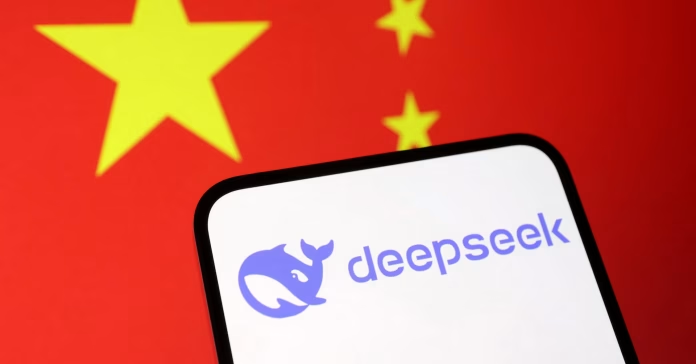DeepSeek is a free generative artificial intelligence virtual assistant , similar to ChatGPT and Google Gemini.
Like other AI chatbots, DeepSeek also collects user data. According to the service’s Privacy Policy, DeepSeek stores users’ personal information, machine data, conversations with the bot, and other data.
Below, we’ll look at what data DeepSeek collects, and see how privacy-related the service is compared to competing generative AIs.
Does DeepSeek collect user data?
Yes. DeepSeek informs on its Privacy Policy page that it collects and stores several types of data: personal user information, interactions with generative AI, technical data about the machine, payment order information, and even actions taken outside of the service.
DeepSeek also states that it may retain the information collected for as long as necessary to provide the service and for other purposes. And the retention time of this data may vary, depending on the type of information, the purposes, and legal requirements.
What user data does DeepSeek collect?
DeepSeek collects different types of data under the premise of enabling the operation and administration of the service, developing and optimizing the language model, and complying with legal obligations. And according to DeepSeek’s Privacy Policy, the data collected includes:
- Profile information: username, date of birth, email address, phone number and password;
- User Submissions: text entries, prompts, uploaded files, chat history, feedback, and other content provided to DeepSeek;
- Contact details: proof of identity or age, as well as questions or feedback about the terms of use or other policies;
- Technical information: machine model, operating system, keystroke pattern or rhythms, IP address, diagnostic and performance data, and device and user ID provided;
- Usage data: features used and actions performed in DeepSeek;
- Cookies: data indicating the time and date a page is viewed, description of the page where the pixel tag is placed, and computer or device information;
- Payment data: payment order and transaction information;
- Logins and linked services: service information (such as access token) when logging in via third-party services, such as Apple or Google;
- Partner Information: Data received from partners or advertisers regarding actions taken outside of DeepSeek, activities on websites or stores, products purchased, mobile identifiers, and email addresses and phone numbers.
Is DeepSeek data sent to China?
Yes. DeepSeek claims that it stores the information it collects on “ secure servers located in the People’s Republic of China .” In fact, data controllers Hangzhou DeepSeek Artificial Intelligence Co., Ltd. and Beijing DeepSeek Artificial Intelligence Co., Ltd. also have registered addresses in the Asian country.
However, it is important to note that China is not the only destination for the data collected by DeepSeek. This is because the service also shares the information with service providers, advertising and analytics partners, and other corporate groups, which may be located in different regions.
Are interactions with DeepSeek used to train the AI?
Yes. DeepSeek collects data from user interactions to review, improve, and develop the service. DeepSeek’s Privacy Policy also states that the information can be used to improve the security of the service, as well as to identify technical issues such as bugs, fraud, and illegal activities.
It is important to note that the use of interaction for training and optimization is not something specific to DeepSeek: machine learning- based models depend on this data for continuous learning and improvements of their neural networks. This is one of the challenges of artificial intelligence.

Is DeepSeek safe?
It is still unclear whether DeepSeek is safe or not. Although the service details what data it collects, there are concerns about keystroke monitoring and the amount of information stored. It is worth noting, however, that DeepSeek’s Privacy Policy is similar to that of OpenAI’s ChatGPT.
It is also not known what protective measures are in place to secure DeepSeek and the data collected. It is worth noting that DeepSeek was the target of data theft in its first month of operation, but ChatGPT and Google Gemini have also suffered attacks or discovered vulnerabilities.
Due to the lack of information about DeepSeek’s data processing, it is recommended that users avoid sharing sensitive data with the AI. In addition, it is possible to limit or withdraw consent regarding the use and collection of data, if necessary.
Can DeepSeek access my files stored on my phone or PC?
DeepSeek’s privacy policy doesn’t mention the ability to access user files stored on a phone or PC. However, the service will collect data from files that are sent to the generative AI.
The document also mentions that DeepSeek can receive information about actions performed outside the service (such as activities on websites and applications, or purchases made), but does not mention files saved on the device that were not shared with the platform.
How does DeepSeek differ from other AIs when it comes to privacy?
DeepSeek’s Privacy Policy may differ from its competitors, including the amount of data collected, retention period, and server locations. Below is a comparison of DeepSeek, ChatGPT, and Google Gemini in terms of privacy .
| DeepSeek | ChatGPT | Google Gemini | |
| Privacy Policy Document | Single | Two versions, based on regionality | Single |
| Data collection | Profile data, interactions, usage inquiries, device information, cookies, payment order data, linked services and certain actions outside of DeepSeek | Profile data, usage queries, ChatGPT survey data, device information, usage data, location information, cookies, and data shared by other sources | Google Assistant data, message and call logs (if used as an assistant); personal information, location data, files sent or received, language, prompts, generated images, feedback, device data, activity on third-party websites that use Google services |
| Use of data | Provide, manage and develop the service, optimize security, and comply with legal obligations | Provide, maintain, and improve services, combat fraud, and comply with legal obligations | Provide, improve and develop products and services |
| Data sharing | With service providers, business partners, DeepSeek corporate group, public authorities, and in corporate transactions | With suppliers and service providers, affiliates, corporate account administrators, government authorities, and in commercial transactions | With service providers, domain administrators using Google services, affiliates, partners |
| Data retention | For the time necessary to provide the services and for other purposes set out in the Privacy Policy | For as long as necessary to provide the service or for legitimate business purposes | Variable period, depending on user settings and data type |
| Children’s data | Does not knowingly collect data from children under the age of 14 | Does not knowingly collect data from children under the age of 13 | Does not collect data from Google Accounts managed by Family Link, as it does not allow the use of these profiles |
| Rights and control | Access to information about data collection and use, in addition to the right to access, change, object, request a copy, withdraw consent, or limit the collection and use of information | Access to information about the use of data, in addition to the right to delete, update, transfer, restrict, revoke consent or oppose its processing | Means to manage, analyze and update your information, adjustments to the storage period of activities, as well as the right to request the removal or export of information |
| Data storage | Servers located in the People’s Republic of China | Servers in multiple territories including the United States | Servers in different regions |
| Data security | Protection against unauthorized access, theft, disclosure, modification or loss of information | Protection against loss, misuse, unauthorized access, disclosure, alteration or destruction of data | Protection against unauthorized access, alteration, disclosure or destruction of collected information |
You can view the Privacy Policies of the AIs mentioned through the official pages of DeepSeek , OpenAI , and Google ( 1 and 2 ).
Is it possible to use DeepSeek anonymously?
Yes. You can download the DeepSeek language model and run it locally, so that your data remains private and only on your machine. To do this, you can use the LM Studio application, which supports the DeepSeek language model and is compatible with Windows, Mac or Linux computers.
In addition to the privacy factor, using DeepSeek locally allows you to use generative artificial intelligence offline. But keep in mind that the process will require more robust machines, with systems on certain architectures and a minimum of 16 GB of RAM.

